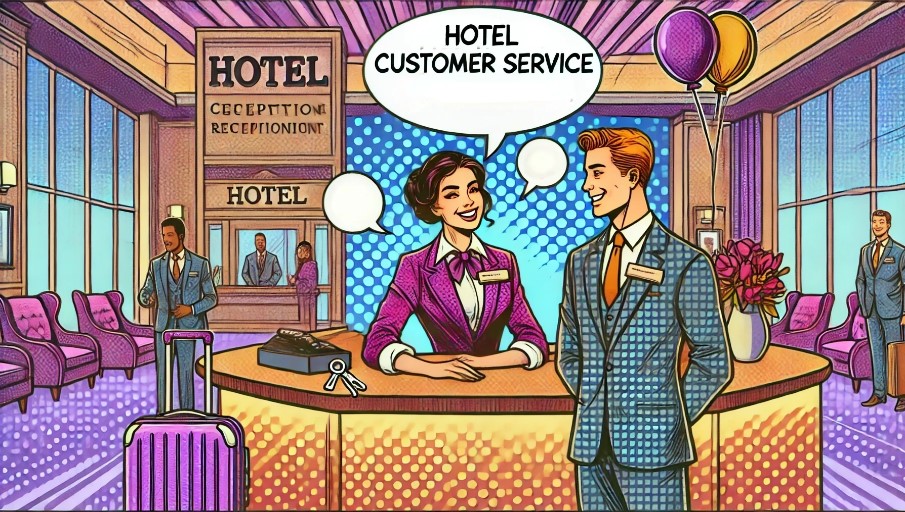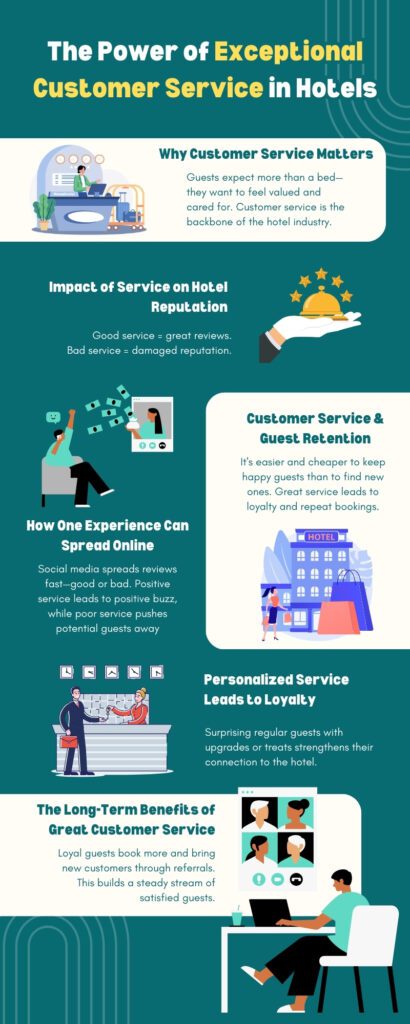Why Hotel Customer Service Matters More Than Ever
05 Apr 2018 By: Mary Dellosa
Updated
World over, providing good customer service is essential in the hospitality sector. Hotels need it to succeed. How guests are treated shapes their experience and the hotel’s reputation.

What is hotel customer service?
A hotel is not just a place to sleep for the guests but more than that. They want being valued and looked after. Customer service is the area where it comes to play. It is the strong support behind the hotel business and it affects the guest’s experience and contentment immediately.
Guests who receive great service often become loyal and recommend the hotel to others. Poor service can lead to bad reviews, fewer bookings, and a damaged reputation.
What is the Direct Impact of Customer Service on Hotel Reputation?
A hotel’s reputation is greatly influenced by customer service. Nowadays, news goes around quickly, thanks to online reviews and social media. One negative experience may get the word out and damage the hotel’s image. Picture a visitor being treated poorly by the reception staff. He or she will probably let it be known on social media, advising others not to go to that hotel. This might scare away possible guests and the hotel’s success might suffer as a result.
Fantastic customer support can result in favorable commentaries and enhance the image of a hotel. When a hotel goes beyond what the guest expected, it creates a good word of mouth that draws in more guests. Just think of a guest who receives super service. They could upload their commendation in the internet, saying that the hotel is very care and very fast in its service. This good feedback will lure more guests and lift the hotel’s reputation of excellent service and hospitality management operations up.
How Customer Service Contributes to Guest Retention?
Excellent customer service is one of the major factors that make guests feel important. When they sense that they are important, they return. It is more convenient and cost-effective for hotels to retain satisfied customers rather than to attract new ones. Customer service-oriented hotels create deep bonds with the guests. Knowing their desires and needs contributes to the making of beautiful, individualized experiences.
Imagine a regular guest at a hotel. The hotel personnel see their dedication and give them a pleasant surprise in the form of an upgraded room or a special treat. This nice gesture improves the guest’s stay and deepens their bond with the hotel. Outstanding digital customer service for hotels creates guest loyalty. Guests who are loyal book more frequently and tell others about their good experience, thus attracting new customers. This steady stream of happy guests helps the hotel thrive.

The Evolution of Customer Service in the Hotel Industry
Over the years, hotel customer service has drastically changed. It has evolved from merely providing essential services to offering memorable experiences. The main objective of the hotels is to make every stay of the guests worth remembering.
From Transactional to Experiential: A Shift in Service Approach
In the past, hotels aimed at fast check-ins, spotless rooms, and good service. However, due to the growing competition, they started to provide distinct, individual experiences instead. Their main goal was to touch guests’ hearts and therefore, every stay would be unforgettable and pleasant. Besides the basic personal greeting, guests’ specific interests, and local activities’ suggestions, hotels are it now all up to the individual guest’s choice.
Imagine that you went to a hotel and the staff welcomed you as if you were an old friend, using your name. They are aware of your pillow and toiletries preferences. There is a personalized note and your favorite treats in the room. You feel really appreciated and looked after.
What is the Role of Technology in Enhancing Customer Service?
Technology has turned around the customer support of hotels. Online booking systems and mobile applications are a quick and comfortable way to make reservations. Hotels apply modern technology to simplify work and improve the customer experience. For instance, self-check-in kiosks and mobile keyless entry allow the guests to avoid the reception and head right to their rooms. In-room tablets provide immediate access to hotel info, concierge services, and room controls.
Innovation is the game, so the hotels are pulling all the technology resources to make sure the customers’ stay is the best. The whole experience gets more lively and convenient with the likes of virtual tours as a pre-booking option and being able to approach the chatbot around the clock for assistance and hints. No wonder the hotels are getting the very most out of the tech they have got! Imagine taking a virtual tour before booking or using a 24/7 chatbot for help and recommendations. The tools save time and make your stay more exciting and convenient.
To sum up, hotel customer service has progressed from mere transactions to the making of unforgettable experiences. The hospitality industry now aims at making personalized services and using technology as the chief means to improve customers’ stays. They are continuously adapting and innovating in order to surpass guest expectations and deliver great service.
What are the Key Elements of Exceptional Hotel Customer Service?

Exceptional hotel customer service is equivalent to unflagging support for the visitors. It is made up of a lot of tiny details that when perfectly executed, leave a lasting impression and make the guests feel important. It is about little things, fast replies, and meticulousness. By emphasising these, unforgettable experiences are created that attract the guests to return.
Personalization: Catering to Individual Guest Needs
Fantastic hotel service signifies treating every visitor individually. Knowing and predicting clients’ needs, hotels can make people feel good and so deserving of the hotel. Customization is about more than just standard amenities. It is also about picking up the guests’ habits in things like room temperature, pillow selection, or food restrictions. Moreover, it is providing special dining, entertainment, and local attractions that fit guest’s tastes. This leads to one’s unforgettable and distinctive experience.
Responsiveness: The Power of Prompt and Efficient Service
Great service is characterized by timeliness and responsiveness. Fast and effective assistance has a considerable impact. Visitors are grateful when their demands and problems are taken care of without delay and in a good manner. Along with the proper measures the hotel will be able to react quickly to the query, but it will also be able to speed up the issue in order to make the guest as comfortable as possible. This creates a nurturing environment in which people are always ready to help and find solutions to problems.
How to Overcome Challenges in Delivering Quality Hotel Customer Service?
Customer service in hotel industry has its challenges. Still, these can be easily conquered if there are right strategies and devotion to superior quality. Awesome hotel service is recognizing the varied requirements and wants of the customers. Every customer is different and has his own peculiar expectations. In order to provide these individual needs hotels have to adapt their services. The personalized guest experience is a memorable and happy stay.
Training and Empowering Staff to Deliver Superior Service
Well-trained and empowered staff are key to great customer service. Hotel employees need the right knowledge, skills, and tools to provide excellent service. Hotels can invest in training programs to teach staff about customer service, communication, problem-solving, and conflict resolution. Empowering employees to make decisions and own guest satisfaction improves service quality. Ongoing training helps staff stay updated on the latest customer service trends. This ensures they are ready to handle any situation during a guest’s stay.
Managing Guest Expectations in a Competitive Market
In a competitive market, managing guest expectations is tough. Hotels must set clear expectations and keep their promises to avoid disappointment and dissatisfaction. Communication is key to managing guest expectations. Hotels should give clear, honest info about services, amenities, and any changes. This helps avoid disappointments and builds positive relationships with guests. Hotels can stand out by offering unique, personalized experiences. By anticipating guest needs and preferences, they can create memorable stays that exceed expectations and set them apart from competitors.
How Outsourcing Can Improve Hotel Customer Service?
Outsourcing customer service can significantly enhance a hotel’s ability to meet and exceed guest expectations. By partnering with specialized service providers, hotels can leverage expertise and resources that may not be available in-house. Here are several ways outsourcing can improve customer service:
- 24/7 Availability: Outsourcing to a 24/7 customer service team ensures that guests receive assistance at any time, day or night. This constant availability enhances guest satisfaction and can address issues promptly, preventing negative experiences.
- Specialized Expertise: Outsourced teams often have extensive training and experience in customer service, providing a higher level of professionalism and efficiency. They are skilled in handling a wide range of guest interactions, from booking inquiries to resolving complaints, which can lead to higher guest satisfaction.
- Scalability: During peak seasons or special events, the demand for customer service can spike. Outsourcing allows hotels to easily scale their support teams up or down based on demand, ensuring that service levels remain high without the challenges of hiring and training temporary staff.
- Multilingual Support: Catering to international guests requires multilingual support, which can be challenging for an in-house team. Outsourcing to a provider with bilingual or multilingual capabilities ensures that all guests feel understood and valued, regardless of their language.
- Focus on Core Competencies: By outsourcing customer service and back-office tasks, hotel staff can focus on their core responsibilities, such as enhancing the on-site guest experience. This shift allows for more personalized and attentive service, which can lead to memorable stays and repeat business.
The Future of Customer Service in Hotels
The future of hotel service is in using technology and being eco-friendly. Hotels now use AI and Machine Learning to improve guest experiences. These tools help provide personalized and exceptional service.
Leveraging AI and Machine Learning for Improved Service
AI and ML can change how hotels interact with guests. Imagine a chatbot answering all your questions right away. These smart assistants can handle everything from room availability to restaurant tips, letting hotel staff focus on more complex tasks. AI does more than answer questions. It analyzes guest data to personalize the entire stay. From suggesting preferred amenities to creating tailored itineraries, AI makes each stay unique and unforgettable.
Machine Learning (ML) makes hotel stays more personal. By analyzing guest data, ML finds patterns and suggests personalized offers and services. If a guest often orders room service, the system can suggest their favorite dishes or offer a late-night snack. These touches boost guest satisfaction and loyalty.
Sustainability and Social Responsibility as Service Differentiators
Hotels now see the importance of sustainability in customer service. Guests want eco-friendly accommodations. Hotels that save energy, reduce waste, and go green attract these guests. Using energy-efficient systems and cutting single-use plastics helps the environment and creates a positive guest experience.
Hotels that support local charities and community projects can make guests feel their stay has a purpose. This builds goodwill and makes a positive impact. Exceptional customer service is key for hotels to succeed. By using technology, personalizing experiences, and focusing on sustainability, hotels can create memorable stays and build strong guest relationships.
To boost your hotel’s customer service, consider HelpSquad BPO. Our affordable, bilingual virtual assistants and 24/7 customer service team make every guest interaction exceptional. Starting at $8.50 per hour, we offer support for customer service, back-office tasks, and research to enhance efficiency and guest satisfaction. Ready to elevate your hotel’s customer service? Start a trial with HelpSquad today and build lasting guest relationships essential for success in the hospitality industry.
What is hotel customer service?
Hotel customer service is how a hotel supports and treats guests throughout their stay, from booking and check-in to requests, problem resolution, and follow-up. It’s not just being polite; it’s making guests feel valued, cared for, and confident they made the right choice.
Why is customer service essential in the hospitality industry?
Because hotels sell an experience, not just a room. Great service increases satisfaction, builds loyalty, and earns positive reviews. Poor service can lead to complaints, bad ratings, fewer bookings, and long-term reputation damage.
How does customer service directly impact a hotel’s reputation?
In a world of instant reviews and social media, a single negative interaction can spread quickly. Great service creates positive buzz and strong ratings, while poor service can discourage future guests and weaken the hotel’s brand.
How does customer service improve guest retention?
When guests feel recognized and cared for, they’re more likely to return. Personalized service, like remembering preferences or offering thoughtful surprises, strengthens emotional connection and loyalty, which is often cheaper than constantly acquiring new guests.
How has hotel customer service evolved over time?
Hotels have shifted from purely transactional service (check-in, clean room, check-out) to experience-driven service. Today, many hotels focus on personalized touches and memorable moments that make guests feel emotionally connected to the property.


